- Home
- Micheal Maxwell
Cole Dust Cole Page 6
Cole Dust Cole Read online
Page 6
“I need some furniture.” Cole felt his face flush.
“Got lots. What ya need?”
“Let’s see, a sofa. I liked the leather one out front, something like that. I need a table and chairs, couple of easy chairs, recliners or something big. Couple of beds, frames, the whole set up. I need a good reliable refrigerator if you got one. Oh, and a couple of throw rugs, got anything like that?”
“Yep. We got to deliver it? Costs more ya know.”
“Well that’s to be expected I guess. I need some dishes too, plates, cups.
“You got cash? We don’t do checks no more.”
“Plastic?”
“Whadda ya mean?”
“Credit card? Visa, American Express?”
“No.”
“Well then I guess I’ll get some cash.”
“Hello.”
Cole turned to see a small thin man smoking a cigarette standing behind him. The man was fair skinned and had curly red hair salted with white. His arms looked like dried leather over bones. He was wearing a cowboy shirt with pearl buttons; the sleeves were rolled up and the top two buttons were unsnapped exposing a tuft of curly hair.
“We got everything you need.” The smoker dropped his cigarette to the floor and crushed it with a twist of his cracked cowboy boot. “My name’s Sherman Burkett, and that there is my partner Jacob Myer, only Jew in Orvin.” Sherman smiled. “Horse kicked him as a kid, played hell with his spine and all. Now you know. So let’s take a look see and find you what you need.” He brushed past Cole and headed for the front door. Cole followed close behind.
“This here is a bargain. Was one-fifty, you can have it for a hundred. Came out of the Tucker Hotel when it shut down. Upstairs lobby; we had a hell of a time gettin’ it down,” Sherman said, lighting another Kool.
“Sold,” Cole said. He was delighted with the bargain; the eight-foot leather sofa appeared to be in perfect condition. It sat on large oak lion’s claw legs, must have been at least fifty years old, and would have cost at least a thousand dollars, even used, in San Francisco.
Sherman and Cole spent the next forty-five minutes lifting, turning and haggling over the prices of tables, chairs and beds. Early on Cole realized that Sherman expected some resistance on his pricing. Cole played along and fell into a pattern of pausing, contemplating, looking around for a similar item, and offering twenty-five percent less than Sherman quoted before agreeing on a ten percent discount for “larger than the average” purchases.
All totaled, Cole spent six hundred dollars and bought more than he intended.
“I got a harelip kid and an Indian fella who help out with deliveries. They charge twenty-five bucks a load. That OK?” Sherman said, signaling with his tone this was not negotiable.
“Sounds fair.” Cole nodded.
“There out back. Now fine?”
“I need to go to the ATM to get some cash. Shouldn’t take long.”
“Gimme your Visa. Jacob’s full of shit; he’s just too damn tight to pay the bank the four percent for credit cards so he says we don’t take ‘em. You’ll need cash for the delivery boys.”
“I heard that!” Jacob Myers growled from his chair behind the counter.
“Got it covered,” Cole offered handing Sherman his credit card.
“So give them a few minutes to get loaded up and they can follow you home. And I thank you kindly.” Sherman nodded his head to Cole, smiled, crumpled his cigarette pack and lit the last Kool.
As Cole, followed by the furniture truck, approached the house he saw huge billows of dust blowing across the road. As they pulled into the drive, Ernie Kappas appeared on the left side of the house. He was plowing the field! Cole honked the horn and waved his arm out the window.
A thin man with a deeply cleft pallet jumped down from the truck. Another man whose face was obscured by the reflection on the window stayed in the truck. The thin man pulled his jeans well above his waist and tucked in his shirt all the way around.
“You got out fifty in cash,” the thin man said, in a voice marred by its nasal tone.
“Fifty? Sherman said it was twenty-five a load.” As Cole spoke he watched as the man tried to pull up his courage and his height.
“Sherman’s not my boss.” The man’s words were blurred with the absence of the S’s.
“Well then take it all back. I’ll call Visa and have them cancel the charge,” Cole replied calling the man’s bluff. The truck door slammed and a short, fat, very dark man came around the front of the truck. This was the man Sherman called the Indian. He pulled his long black hair back over his shoulders and walked directly up to Cole.
As he spoke there was the strong stale odor of whiskey on his breath. “Sherman said you had money.”
“Yeah, but I got a feeling you won’t see any of it. Your friend here is trying to gouge me on the delivery fee. Sherman said twenty-five bucks and that’s what I’ll pay. Take it or leave it.”
The Indian looked around at his friend. “Willie, how much you tell him it cost to bring this shit out here?”
“Fifty bucks.”
“He made a mistake. It’s a hundred.”
“Have a nice day.” Cole turned and walked to the door. Behind him he could hear the two men arguing in angry loud whispers. As Cole fumbled with the door lock he heard Willie say, “Sherman will cut us off. No more loads. Now you done it Alvin!”
“Shut up, I ain’t done nuthin’! Let me think!”
Cole opened the door and went inside. He watched as Alvin paced back and forth in front of the truck. Willie moved to the side of the house and stood looking into the field. At first it seemed he was watching Ernie plow, but then he called Alvin’s name and motioned him to come and look at something. The men disappeared from Cole’s view so he moved to the kitchen window.
Willie walked over to the burned barn. In quite a state of excitement he was pointing at the rusted tractor, waving his arms and saying something to Alvin, while walking back and forth through the charred soil. A knock on the back door drew Cole’s attention away from the delivery men.
“What in hell’s half acre are those two dip shits doing here?” Ernie said, nearly knocking Cole over charging through the door.
“They are delivering my new furniture.”
“The hell you say, and stealing everything that ain’t nailed or chained down.”
“We seemed to have reached an impasse on the price,” Cole said, moving back to the window.
“Let me handle it, I’ll kick their asses from here to Tulsa.”
“I’d help but I kind of need the furniture.”
Cole and Ernie watched out the window as the two men kicked, lifted and seemed to inventory the items left unburned from the barn fire. They came together and pointed and chatted feverishly. They walked to the tractor and rocked it back and forth. Satisfied with whatever they were hatching they left the barn and made their way back to the front of the house. Cole and Ernie met them as they approached the porch.
“We got a deal for you,” Willie said.
“The hell you say,” Ernie growled.
“Not you. Him,” Alvin said, stepping in front of Willie.
“What is it?” Cole said flatly.
“We’ll swap you the junk out here where the barn were for the dee-livery charges.”
“It’s worth a lot more than fifty bucks,” Ernie barked.
“Charges are a hundred,” Willie offered.
“You’ll place my furniture where I want it? Not just drop it in the middle of the floor? You’ll take all the metal, not just the big stuff? Is that the deal?”
“Yup.” Alvin nodded.
“Any funny business I’ll put my boot so far up your ass your tonsil’ll read Tony Llama, you got me Indian?” Ernie jabbed his finger towards Alvin.
Alvin looked at Cole then Willie and back to Ernie. “We don’t want no trouble, just to do business.”
“So let’s get it done,” Cole said, putting an end to the discussion
.
Willie and Alvin unloaded the truck, and the sofa was moved into the living room, the table and chairs in the kitchen, unrolled the throw rugs in the living room and bedrooms, the bed frames assembled and mattresses in place upstairs, and the dishes, lamps and smaller items stacked neatly on the kitchen table. Ernie asked Cole if he was satisfied with the job and when Cole said he was, ordered the delivery men out of the house and in a hushed growl that Cole could not quite make out, threatened the pair with a profane burst that left no question as to whether they were welcome back.
Willie backed the truck around to the barn. Alvin attached a series of hooks and chains to the old tractor and Willie operated the winch that pulled it up the ramp and onto the truck bed with screeches and groans that almost sounded like a plea from the old John Deere to be left on the farm. The spring harrow and plow were dragged up next. Somehow the two men got the equipment turned on end and in a masterful job of space usage were able to fit all the loose pieces of pipe, iron and steel onto the truck with room to spare. Willie made one more pass over the scorched ground, picking up a horseshoe here and a railroad spike there, until he was satisfied he gleaned every bit of scrap metal from the remains of the old barn. Alvin secured the load with ropes and chains and stowed the ramp beneath the truck bed. Without a word or wave goodbye they were gone.
Ernie went back out and started his tractor and made several passes over where the barn once stood. Within minutes the ground was plowed with deep furrows of brown soil. The soot and ashes were gone and so was any trace of the dilapidated building’s location. Cole looked out over his land, where the day before, was an ocean of tumbleweeds, was now a freshly plowed field with straight rows of dark, rich soil. The pond and its grassy banks looked like an oasis ready to water and nourish the waiting ground around it.
Ernie pulled the tractor, plow raised, to where Cole stood. “Got ‘er done!” he yelled over the noise of the tractor.
“Looks great!” Cole yelled back.
Ernie killed the engine and said, “I called Burt Swanson, the Butane man. He’ll be out tomorrow, get you set up. After work I’ll come by and see if we can’t get that pump to work. You could damn sure use a shower. You smell like that goddamn Indian.” Ernie laughed. “Hell of a pair, huh?”
“I sure do appreciate all your help. I owe you one.”
“Two. I chased the riff raff off too.” Ernie laughed good heartedly. “They won’t bother you. They’ll sell that scrap, get good and drunk till the money runs out and will have forgot all about you, the delivery, and the scrap by sundown Tuesday night. They are too damn dumb to be of any threat to anyone but themselves.” Ernie fired up the tractor. “I’ll see you tomorrow!” He put the tractor in gear and was on his way home before Cole could respond.
Cole went in the house and admired his new sofa. In the kitchen he put his new set of dishes in the sink; he would wash them as soon as there was water. He was carrying a lamp to the office when he heard a strange sound overhead. He stood still and strained to hear where the sound was coming from. The house was silent, no fans, air conditioner or refrigerators running to make the usual white noise of the American home. He placed the lamp on the desk and plugged it in. There it was again, a bumping sound above him. In the hall the noise was more pronounced. He walked toward the back of the house. The door leading to the attic was ajar and as he passed it the noise came again. A bumping thud from up the stairs.
As he climbed the stairs he knew the sound was coming from the attic. Opening the attic door at the top of the stairs he found the room bathed in light. The sun was pouring through the shattered window. A pigeon flew into the room and was now thumping against the ceiling and walls in the blind panic of futile escape. Cole opened the window careful not to release any more of the shattered glass. The pigeon collapsed in an exhausted heap against the wall. Cole slowly approached the bird. He made sure that he did not cast a shadow. The bird’s chest heaved as it lay against the wall. In a swift movement Cole grabbed the bird and walked it to the window. With a gentle movement he lifted and released the bird back into the wind.
Unlike the rest of the house the attic was relatively free of dust. Even with the broken window there was little silt on the floor. Cole determined that the broken window was done fairly recently, since the glass had little or no dust on it where it lay on the floor. In the corner of the attic to the left of the door was a trunk that Cole didn’t notice when he first entered the room.
SIX
Cole went to the corner and bent to open the trunk. The latch was locked. Cole pushed the trunk. It didn’t budge. He took the handle and tried to lift the trunk, with great effort. Unable to lift it more than a few inches off the floor, Cole decided to drag the trunk into the light from the window. The trunk was about three feet wide, two feet deep and about two feet high. It didn’t strike Cole as being expensive, but it was quite old. Without hesitating, he ran downstairs to get a screw driver to pry open the latch.
It took less than a minute to pop the latch on the trunk. Cole smiled as the latch clanked against the front of the trunk. He unclasped the two clip latches on the face and took a deep breath and lifted the lid. Inside were not bars of gold, strings of pearls or antiques from the Civil War. There was no lacy wedding gown yellowed with age or a faded uniform from a faraway war. This was not a hope chest or a collection of childhood toys. The trunk was full to the top with notebooks.
The notebooks were bundled together and bound with twine. They were neatly stacked and the front of each was labeled with the date and the owner’s name, George Albert Sage, Cole’s grandfather.
On top of the stacks of notebooks was an envelope. The address was simply The Sage Farm, Orvin Oklahoma. The return address was torn away when the envelope was opened. All that remained printed in pale blue ink was “fornia”. Cole slipped the single sheet of paper from the envelope.
May 30, 1957
To whom it may concern;
This trunk was left behind with the passing of George Sage. Mrs. Vera Johnson took care of the funeral and other arrangements. Mrs. Johnson, being the most Christian of women, paid me a month’s rent that was owed and told me to keep anything I wanted in the house and the garage. I sold several items and used part of the money to ship this trunk.
George was a fine man, good storyteller and a hell of a card player. It was his wish that these notebooks go to his relatives. Since Mrs. Johnson did not have an address to give me, I shipped to the only address I had.
If the receiver of this trunk and its contents is not a relative of Mr. George Sage, do with it as you may. Relatives should know this bunch of notebooks was important to him.
Yours Truly,
William G. Hildebrandt
Landlord
Cole removed the top bundle from the trunk, carefully untied the twine and took the top notebook to the window for better light. He turned the notebook in his hands. The fabric binding was a bit frayed but still tight. The thick hard paper covers were creased but not torn. On the back of the book were the drawings of a child: horses, Indians, campfires and cowboys done in pencil. Cole ran his finger gently over the name on the cover, then opened the notebook. He could hardly believe his eyes as he looked down on the handwriting of his grandfather.
George Sage died when Cole was five and so his only memories were of a big grey haired man who took him for walks and cut up candy bars with his pocketknife. Cole’s father never spoke much of his parents after their deaths. His mother was not fond of these “Okies” as she always referred to them, and her only mention of them was in snide comments about his father’s upbringing.
The writing was in pencil and showed the concentration and dead aim of someone not wanting to make a mistake. Cole’s heart was pounding as he began to read.
September 22, 1912
My name is George Albert Sage. I was born on February 15, 1900. I want to be a writer, so I have started this book. My sister Effie told me that Charles Dickens wrote about his life in his
books. I just finished reading Great Expectations and I think Mr. Charles Dickens is the greatest writer that ever lived.
My sister Effie is not just my sister but she is my schoolteacher, too. She told the class today that a lot of people keep a diary. Each day they write down what happened. I don’t like that idea. I want to write books like Mr. Charles Dickens. If I am Pip, then I will tell the story like somebody else told it. Like Mr. Dickens did.
I figure if I write what happens to me from now on I will have enough stories to write a book from someday. That is not to say I have an adventurous life. I do not. But something has to happen someday and I don’t want to miss it. I will try to tell the truth. My ma and pa say I make up stories all the time. Some are not true.
If you are reading this don’t be snooping around my stuff. If you are reading this and I am dead, it’s all right.
I will now try my first story.
He awoke with the sun. He dressed and went to school. The day was long and hot. His collar rubbed his neck. Anna Carlson looked very pretty in her new pink and white dress. Her hair looked like gold in the sun. She has won the heart of our hero. Someday he will save her from danger but for now he must just enjoy looking at her beauty.
Tom Wilkerson, who is a villain and bully, tormented George Sage at lunch hour. He knocked over his pail and spilled his lunch. Poor George was afraid Tom would punch him in the nose, so he did nothing. Someday George will grow to be as big as Tom and give him a lickin’ he won’t soon forget.

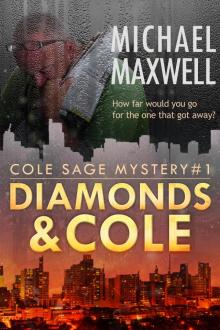 Diamonds and Cole: Cole Sage Mystery #1
Diamonds and Cole: Cole Sage Mystery #1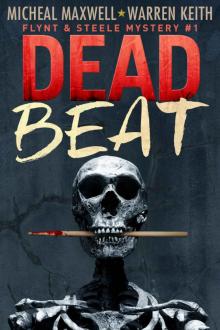 Dead Beat
Dead Beat![[Cole Sage 03.0] Helix of Cole Read online](http://i1.bookreadfree.com/28/cole_sage_03_0_helix_of_cole_preview.jpg) [Cole Sage 03.0] Helix of Cole
[Cole Sage 03.0] Helix of Cole Dupree's Rebirth
Dupree's Rebirth Dupree's Resolve
Dupree's Resolve Dead Duck
Dead Duck East of the Jordan (A Logan Connor Thriller Book 2)
East of the Jordan (A Logan Connor Thriller Book 2)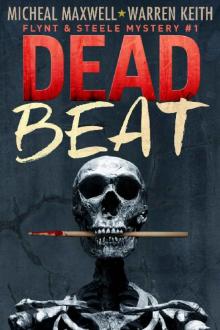 Dead Beat (Flynt and Steele Mystery Book 1)
Dead Beat (Flynt and Steele Mystery Book 1) Dead Duck (Flynt & Steele Mysteries Book 2)
Dead Duck (Flynt & Steele Mysteries Book 2)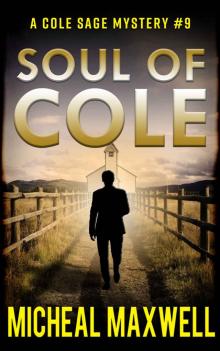 Soul of Cole
Soul of Cole Clean Cut Kid (A Logan Connor Thriller Book 1)
Clean Cut Kid (A Logan Connor Thriller Book 1) Cellar Full of Cole: A Cole Sage Mystery #2
Cellar Full of Cole: A Cole Sage Mystery #2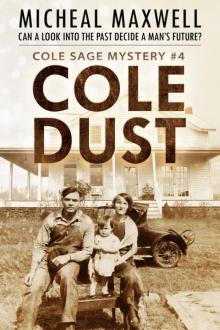 Cole Dust Cole
Cole Dust Cole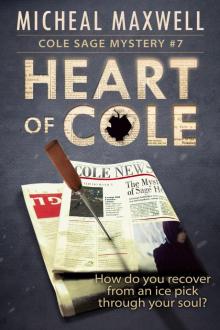 Heart of Cole
Heart of Cole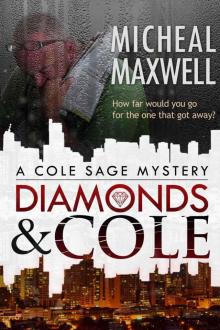 Diamonds and Cole: A Cole Sage Mystery
Diamonds and Cole: A Cole Sage Mystery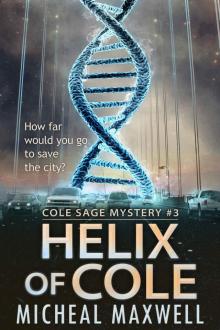 Helix of Cole
Helix of Cole Cole Shoot
Cole Shoot